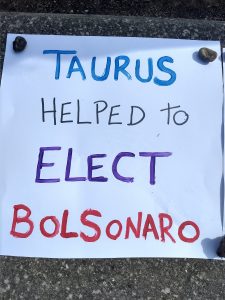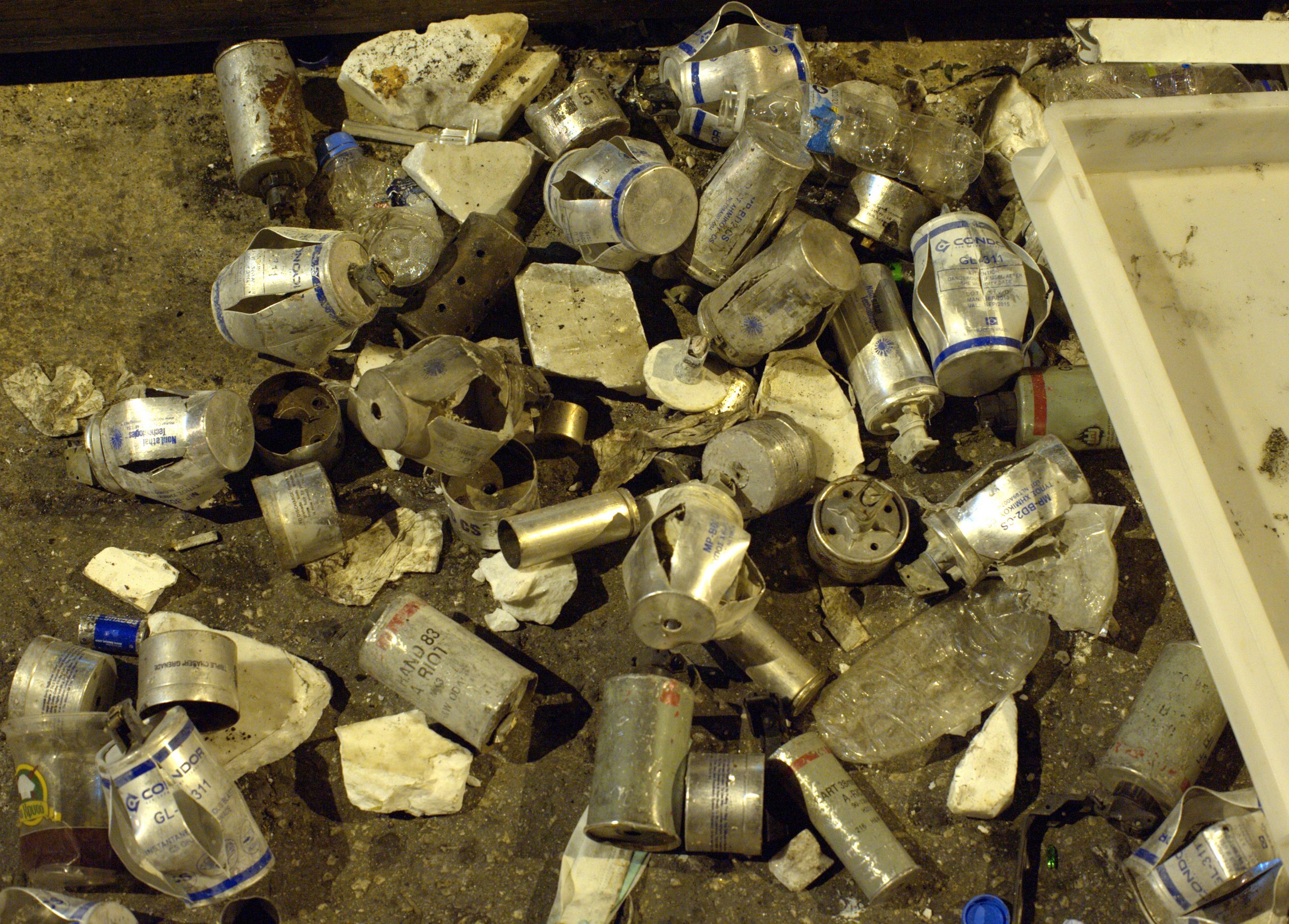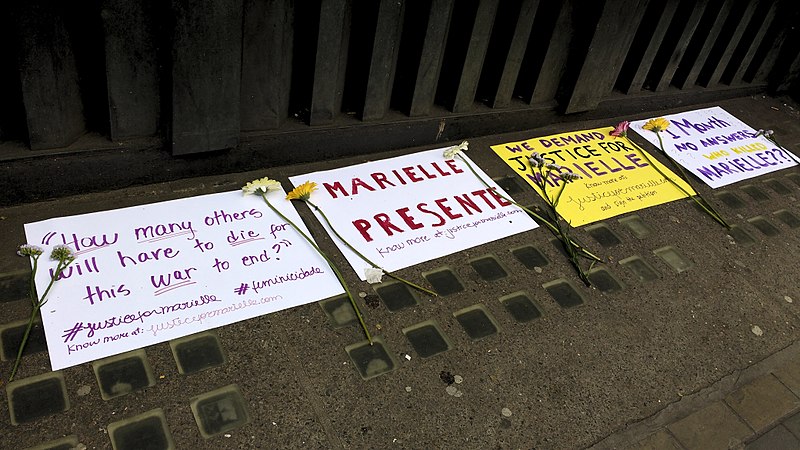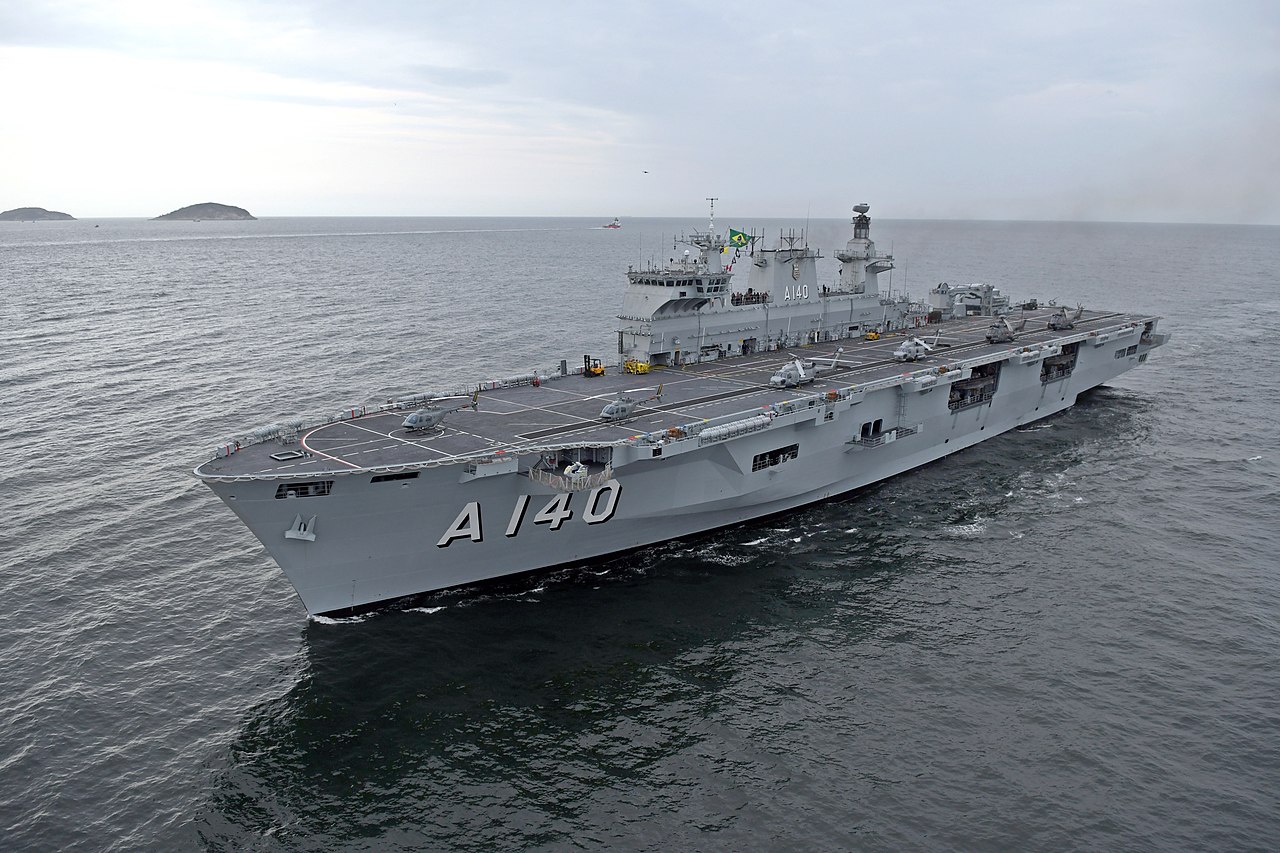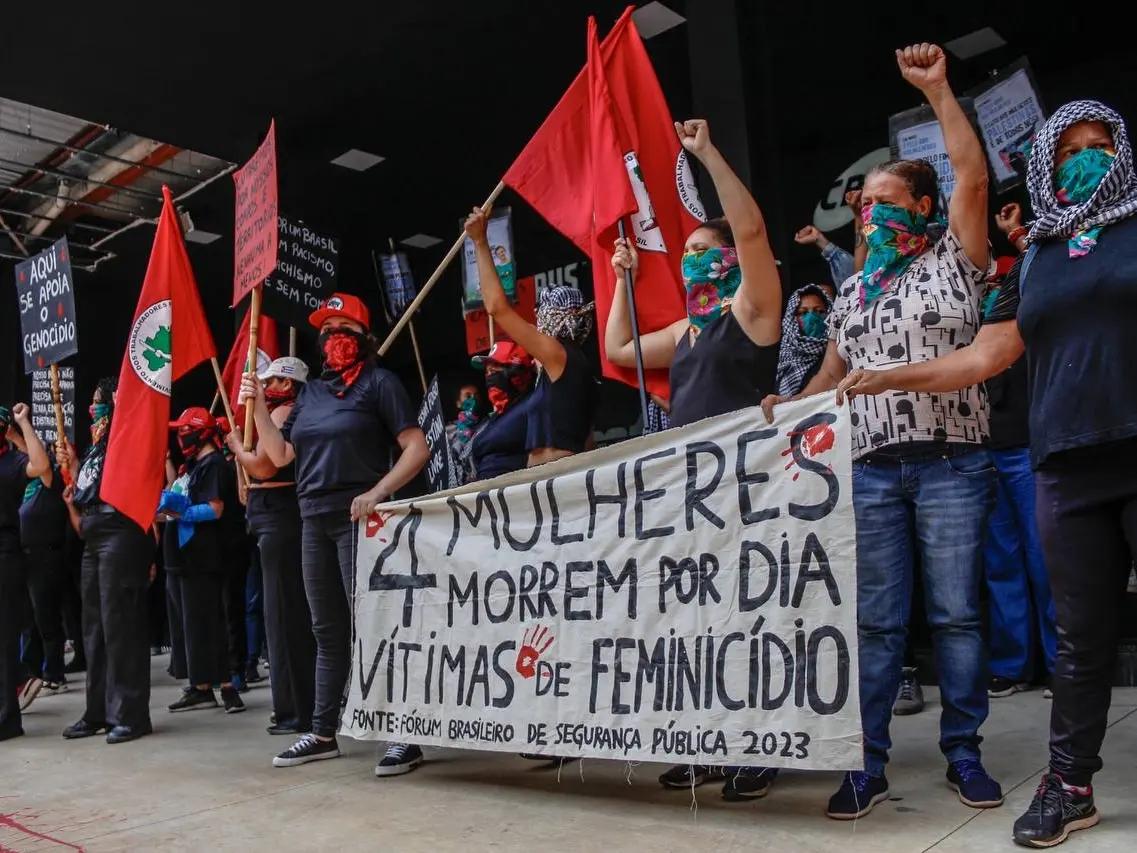Brazil has a significant arms industry of its own which regularly exhibits at the DSEI arms fair in London. There are significant links between the Brazilian and Israeli arms industries.
Overview
Brazilian arms exports are regulated by the National Policy for the Exportation of Material for Military Use (PNEMEM), a law from 1974, inherited from the military regime. It establishes that information on arms exports can only be accessed publicly through the Law of Access to Information – meaning civil society and citizens seeking such information must make specific, formal requests, with the requested information released at the government’s discretion. Criticisms by civil society of Brazil’s lack of transparency on arms exports – increased transparency being a provision of the Arms Trade Treaty (ATT), to which Brazil is a signatory – have been met with claims of national security and business confidentiality. Since Brazil’s signing of the ATT, it is hoped that PNEMEM will be updated, but this has not happened yet.
According to SIPRI, Brazil went from the 18th to the 21st highest military spender worldwide between 2015 and 2024, in a regular trend of decreased spending since 2015. Brazil’s military spending represents 1% of the country’s GDP. Brazil was the 24th biggest major arms exporter between 2020-24, accounting for 0,3% of global exports, up from 0.2% in 2015-19. The main receiving countries of Brazilian arms exports were Portugal (25%), France (22%), and Hungary (13%).
Major Brazilian arms companies include aircraft producer Embraer, which mostly produces civil aircraft, but also the Super Tucano trainer/light attack aircraft, which has been sold to conflict-affected countries around the world; Condor non-lethal technologies, a major tear-gas producer; and Taurus, one of the largest producers of small arms in the world.
Brazil has thus a substantial domestic arms industry, which it is seeking to develop further with a goal of attaining a large degree of self-sufficiency in arms production.
It is using major arms imports, in particular the Gripen combat aircraft from Sweden and submarines (including a nuclear submarine) from France, to gain technology transfers, training, and local co-production, with the aim of being able to design and produce such systems independently in the future.
Brazil hosts a major biennial arms fair, LAAD Defence and Security, which claims to be “the leading defence and security exhibition in Latin America”. The arms fair is strongly supported by the Brazilian government and armed forces.
The most recent such event was LAAD Defense and Security 2025, which had 414 exhibitors and 160 official delegations, including one from the UK.
Major Brazilian arms companies
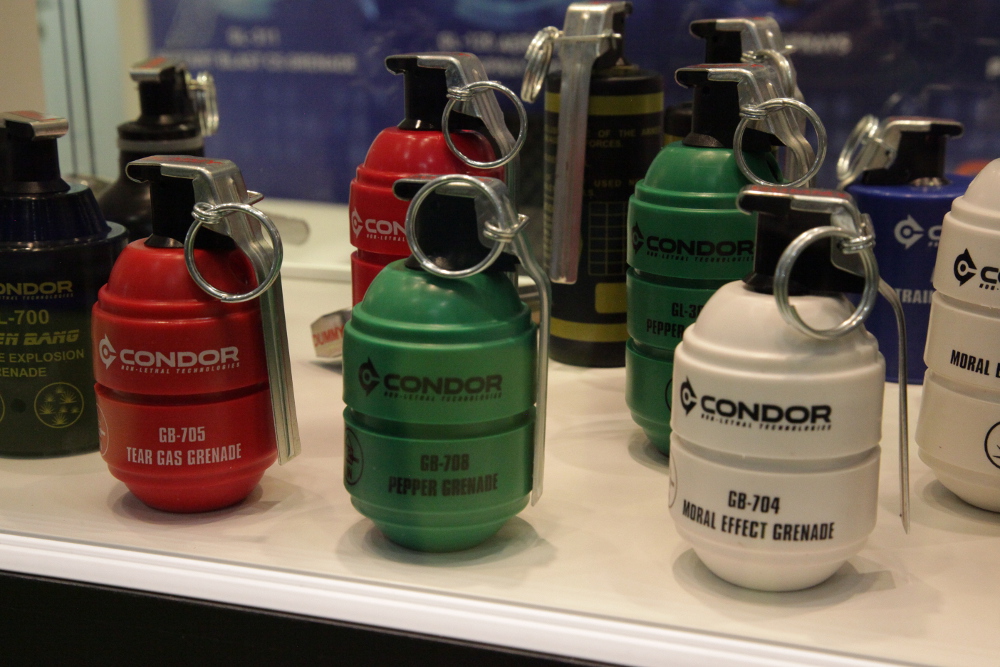
Photo c. Sharron Ward
Condor Non-Lethal Technologies
Condor Non-Lethal Technologies is a Rio-based company, specialising in tear gas, pepper spray, stun guns, rubber bullets, smoke grenades, impact grenades and pyrotechnics. It was founded in 1985, with headquarters in Nova Iguaçu, in the state of Minas Gerais. It started as a supplier of smoke grenades to the Brazilian army but now supplies weapons that have been used to aid repression and counter dissent all over the world.
It sells to militaries, police forces, and the UN, and also offers training to public and private institutions around the world. The company was founded in 1985 and regularly exhibits at DSEI and other arms fairs, such as Milipol.
The company’s weapons have been used to aid repression and counter dissent all over the world. Its tear gas has also been used in Bahrain, Egypt, Greece, Pakistan, Sudan, Turkey, Venezuela, and Brazil itself.
Venezuela and Pakistan
Between 2008 and 2011, the Venezuelan government bought 150 tonnes of Condor’s tear gas. Its tear gas has also been used in Turkey, Bahrain, Greece, Egypt and Brazil itself. In 2017, Amnesty International identified their use against protestors.
Footage verified by Amnesty International shows Condor weapons being used to violently suppress protests in Venezuela in 2017 and in Pakistan in February 2023. During demonstrations in Caracas in 2017, protesters were struck directly by tear gas grenades manufactured by Condor, while another video from the same protest documented police firing excessive amounts of gas. Brazilian export records indicate that in 2010 more than US$200,000 worth of grenades and other projectiles were shipped to Venezuela, and in 2021 over US$100,000 of similar goods were exported to Pakistan, all originating from Nova Iguaçu, where Condor is based.
Sudan
Also according to Amnesty, in November 2021, verified photographs revealed that Sudanese security forces used Condor’s GL-202 Long Range Tear Gas Projectile against protesters in Khartoum. The Central Committee of Sudanese Doctors (CCSD) reported 537 blunt trauma injuries from tear gas projectiles between 25 October 2021 and 6 January 2022, including 135 head injuries and 12 to the eyes. During the same crackdown, Amnesty International documented at least 40 deaths, most caused by live ammunition. Brazilian government trade data shows that in September 2021, grenades and other projectiles worth about US$1.6 million were exported from Nova Iguaçu—where Condor is headquartered—to Sudan, indicating that the company supplied this equipment directly.
Turkey
Tear gas made by Condor was used against protesters in Turkey in June 2013. The effects of tear gas were particularly harmful in the Turkish protests
A Physicians for Human Rights investigation reported that there were
“8,000 injuries due to tear gas, rubber bullets, water cannons, beatings, and live ammunition.”
It is believed that eleven people lost their eyes after being struck by tear gas canisters during the demonstrations, and one protester was possibly killed.
Bahrain
Condor has sold tear gas to Bahrain and other Gulf Cooperation Council (GCC) countries, and may well continue to do so. When protests against the Bahraini regime began in February 2011, the Bahraini authorities – assisted by Saudi Arabia and other GCC countries – engaged in massive repression against protesters.
Tear gas was used on an unprecedented scale, often at close range and even in people’s homes, causing severe injury and at least 34 deaths. Used Condor tear gas canisters were among those documented by human rights organizations. The death of a protester in a Bahraini village in 2015 was specifically linked to Condor tear gas, leading to a complaint by an NGO coalition against the company that year.
Condor claimed that the Bahraini authorities had not followed the instructions correctly. The company made similar claims when security forces in Egypt and Turkey appeared to be using their equipment in order to intentionally increase harm or even “systematically torture”.
Greece
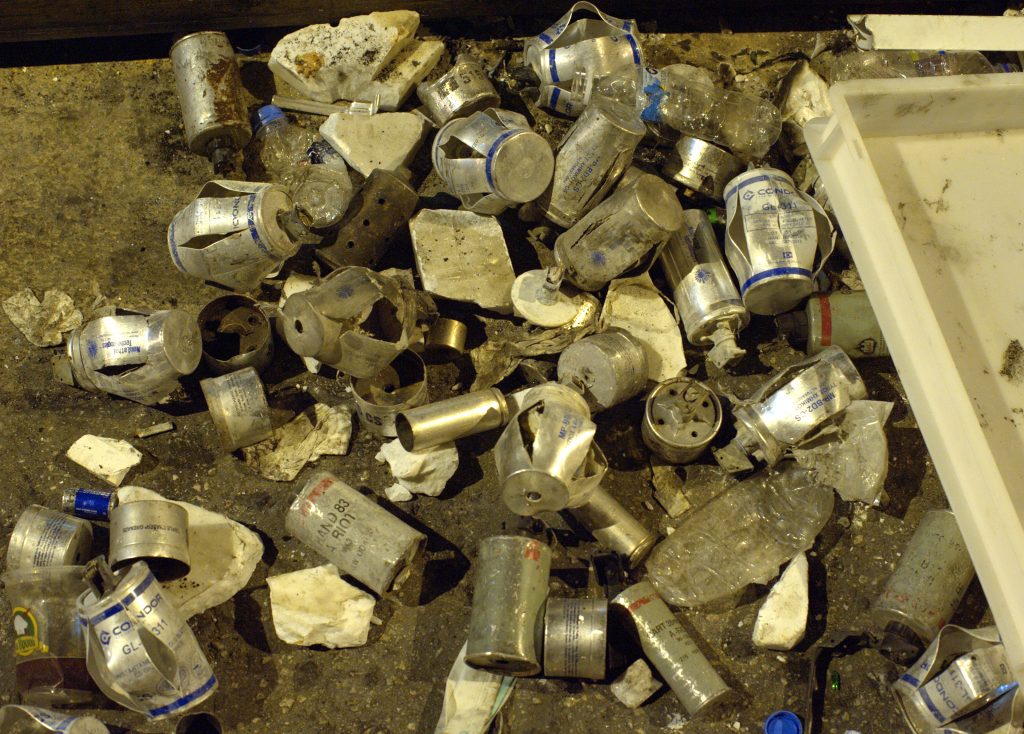
Condor’s tear gas has also been used in Greece, including during the 2011 anti-austerity protests, when an investigation was launched into the violent response of police and the use of tear gas against protesters.
Embraer
The third largest producer of commercial aircraft in the world after Boeing and Airbus, around 16% of Embraer’s sales are nonetheless from arms.
Embraer produces the Super Tucano trainer/light attack aircraft, which has been exported by Brazil to 15 countries worldwide between 2008-2017. It is particularly popular for counter-insurgency purposes, including in numerous ongoing conflict countries such as Afghanistan, Colombia, Mali, Nigeria, and Pakistan. The Super Tucano is also produced under licence in the US, from where it is also exported. (The Nigerian planes were from the US production line, for example).
Embraer has also led development of a new military transport aircraft, the KC-390, along with other South American partners. Embraer was listed by SIPRI as the 84th largest arms company in the world outside China in 2017, with arms sales of $950 million. It is not currently listed in the Top 100.
Helibras
A Brazilian subsidiary of Airbus, producing military and civil helicopters; its military helicopters are mostly used by the Brazilian armed forces.
Odebrecht
Odebrecht is a giant Brazilian infrastructure and construction company that has also developed interests in the arms industry. In particular, it won the contract for construction of a new submarine construction facility and naval base for the submarines bought from France in 2009.
Odebrecht has been heavily implicated in the massive Lava Jato corruption investigation in Brazil, for paying massive bribes to win contracts in all sectors of their business, including €45 million in bribes linked to the submarine contract.
Taurus
Taurus claims to be one of the three largest small arms manufacturers in the world.
According to its website: “The company produces a wide range of models of weapons and accessories, including holsters, revolvers, pistols, machine guns and long guns used for the markets of the military and police as well as to the civil market.”
It exports to around 80 countries worldwide, with a particular focus on the US market, where it also has a subsidiary.
Taurus was a major winner from Jair Bolsonaro’s election in 2018. Company sales and share value skyrocketed during his tenure, thanks mostly to his loosening of Brazilian gun laws. They have since been reverted by the Lula government, which has affected the company’s results and has caused it to reorient its objectives to foreign markets.
They report active business development across several international markets. In Saudi Arabia Taurus has engaged with the Royal Guard and the National Guard to supply a range of rifles and submachine guns, and a joint-venture project with Scopa Military Industries is progressing — including a business plan, site and technology-transfer proposal. That Saudi plan foresees short-term local manufacture of 9mm pistols and 5.56 and .300 BLK rifles, and medium/long-term expansion up to .50-caliber weapons to serve Saudi domestic demand.
There are several allegations that Saudi Arabia and its coalition partners have committed war crimes in the war in Yemen, including use of firearms or small arms (rifles) in ways that violate international humanitarian law. The UN Group of Experts on Yemen has stated that Saudi-led coalition forces and pro-government forces have used small arms fire (i.e. rifles or similar) in attacks that violate the principle of distinction—shooting into or around civilian areas without adequately distinguishing combatants from non-combatants. There are also reports of diversion of rifles and small arms to militias aligned with the Saudi/UAE coalition inside Yemen, which raises concerns about those weapons being used in non-state operations that commit abuses against civilians.
A 2023 Human Rights Watch report documents systematic, often lethal use of force by Saudi border forces against Ethiopian migrants at the Yemen–Saudi border, with hundreds killed between March 2022 and June 2023, in cases that may amount to crimes against humanity). NGO reporting shows that SANG has been used as a domestic security force, notably during past unrest in the Eastern Province and during periods of political unrest (Arab Spring era and after). Analysts document SANG’s role in suppressing protests and in internal security operations.
In the Philippines, Taurus has won two tenders for TS9 pistols (for the Prison Police) and T4 rifles (for municipal police forces), building on prior military sales in that market. In India their local plant is operating and selling in the civilian market while they participate in tenders: TS9 pistols, T9 submachine guns, and T4 and T10 rifles for paramilitary forces and state police. Those tenders—scheduled to conclude in the first half of 2025—collectively exceed demand for 20,000 units.
Multiple reports by Human Rights Watch, the U.S. State Department, local human rights groups and Amnesty International have documented patterns of abuse by police, prison guards, paramilitary auxiliaries (e.g. CAFGU, Citizen’s Armed Forces Geographical Units, Civilian Volunteer Organizations) and municipal or local law enforcement. Abuses include extrajudicial killings, torture or cruel, inhuman, degrading treatment during arrest, detention, or interrogation, enforced disappearances, arbitrary detention, and use of excessive force during protests. Prisons and detention centers are regularly severely overcrowded; inmates are physically abused by guards; women detainees are especially vulnerable to sexual abuse or assault. Municipal police have been found to use lethal force in “drug war” type operations and protests (for example Kidapawan in 2016) including shootings and baton use against civilians, sometimes resulting in deaths and injuries. Paramilitary forces or state-backed militia and vigilante groups have been implicated in political killings, intimidation of human rights defenders, attacks on indigenous communities (Lumad), forced evacuations, arson, and looting.
Taurus also note specific Indian contract activity and testing: 550 T9 submachine guns produced locally from parts-kits sent from Brazil under a contract with the Indian Army’s Northern Command. Separately, the large bidding process for 425,000 rifles for the Indian Army is underway. Indian Army abuses have been documented in Jammu and Kashmir and other “disturbed” areas, including summary executions, extrajudicial killings, torture (including electric shocks, beatings, sexual violence), use of lethal or indiscriminate force against protesters, enforced disappearances, and impunity—security personnel rarely face serious criminal accountability.
Finally, Omega Research Foundation reports the shipping of 8,000 handguns by Taurus to Fares Mohammed Hassan Mana’a, a known Yemeni arms trafficker. According to court documents, the handguns were initially intended for Djibouti but were redirected by Mana’a for use in Yemen, which was the subject of a UN arms embargo. Also according to this report, in 2015 it was reported that Taurus had also arranged to sell firearms to Mana’a’s son, Adeeb Mana’a. According to a UN report, the firearms were ‘very likely destined for the black market in Somaliland and the wider region, but were seized by Saudi Arabia in transit.
